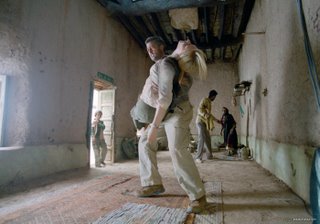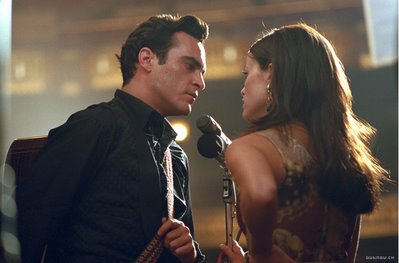 Idea: Spanish conquistador Tomas (Hugh Jackman) searches the jungles of what is now Ecuador for the Tree of Life, as charged by his Queen, Isabel (Rachel Weisz). Present day (or slightly into the future?) Tommy searches for a cure for his wife, Izzi's, terminal brain tumor. Far into the future, Tom traverses the universe to reach the centre of a nebula wrapped around a dying star.
Idea: Spanish conquistador Tomas (Hugh Jackman) searches the jungles of what is now Ecuador for the Tree of Life, as charged by his Queen, Isabel (Rachel Weisz). Present day (or slightly into the future?) Tommy searches for a cure for his wife, Izzi's, terminal brain tumor. Far into the future, Tom traverses the universe to reach the centre of a nebula wrapped around a dying star.For far more time than is reasonable or necessary, Em and I went back and forth after screening this movie on Sunday. The back and forth had two parts: 1) wondering what we just saw, and 2) giggling. Which makes this review a little more difficult than usual.
Darren Aronofsky's third feature length film is visually stunning. His DP, Matthew Libatique, better be getting his due in a big way come awards time. Instead of the now-standard CGI, they opted for micro-photography of chemical reactions to create the film's unique look. Everything is set up perfectly for the eye: from the shots (heavy on the close-ups and high angles) to the lighting (take a look above - all very low and supernatural, as though the earth itself is lit from within).
Darren Aronofsky's third feature length film is superbly acted. Weisz and Jackman have
 wonderful chemistry, and it's a testament to both of them, as well as their writer-director, that they manage to make their relationship seem passionate yet tentative (in the conquistador story) and warmly lived-in (in the almost now one). Jackman quivers with impassioned fury as the embodiment of chivalrous love, and he's gut-wrenching as he crawls his way through the stages of grief. Weisz matches him frame for frame, though she's much less the protagonist than he is, and, to a certain extent, much less of a character. As is so frequently the case in these sort of stories (think The Odyssey or any medieval romance), the woman is less a person than she is the avatar of virtue. Weisz gives Izzi more three dimensionality than I am suggesting, but still.
wonderful chemistry, and it's a testament to both of them, as well as their writer-director, that they manage to make their relationship seem passionate yet tentative (in the conquistador story) and warmly lived-in (in the almost now one). Jackman quivers with impassioned fury as the embodiment of chivalrous love, and he's gut-wrenching as he crawls his way through the stages of grief. Weisz matches him frame for frame, though she's much less the protagonist than he is, and, to a certain extent, much less of a character. As is so frequently the case in these sort of stories (think The Odyssey or any medieval romance), the woman is less a person than she is the avatar of virtue. Weisz gives Izzi more three dimensionality than I am suggesting, but still.Darren Aronofsky's third feature length film is alive with imagery. The way he criss-crosses through world religion, folklore, and traditional theatrical symbolism is a sight to behold. In any one scene there are hundreds of culture clues to pick up. With Clint Mansell's lovely, lilting score drifting through the scenes, it's hard not to let it carry you off as well.
So it's too bad that Darren Aronofsky's third feature length film makes no sense. Symbolism without substance has no meaning at all (although it did occur to me that this movie would be a semiotician's dream). As a mediation on grief, Aronofsky's picture is bar none, but as a movie? Emotional and evocative, to be sure, but it lacks a core argument to sustain the premise as it moves through time. I wouldn't recommend this movie to anyone, but I wouldn't ward them off of seeing it either because I know I would see it again. It sort of casts a dreamy haze over you. B










